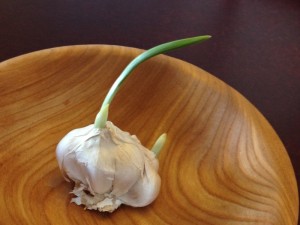
This morning, I sacrificed an onion for my breakfast. When I cut it in half, I noticed its center was greening up. February barely has its pants on, I thought, and yet this onion, at least on the inside, is thinking about spring. And it isn’t the only bulb in my kitchen with such thoughts; the garlic is sprouting, too. I found myself looking out the window at the snowy yard and wondering if, down below, the bulbs were flexing their sense of green, listening for cues from sun and dirt for the right moment to send forth a shoot.
Even in the fallow times, when the days are still cold and the night is long, growth happens, though it might be hidden from sight.
When I was a kid, we had a resplendent vegetable garden, mostly tended by my father, who also took on the annual task of food preservation. Our winter pantry was filled with jars of dried legumes, canned tomatoes, courses of braided onion and garlic bulbs, newspaper-wrapped cabbage heads and wooden boxes filled with carrots packed in sand. ‘Round about now, in early February, those carrots would become perfect; incredibly crisp and sweet. Later, when they turned woody and unpalatable, we’d feed them to the goats or go back to putting them in stews, but for a few weeks, we’d revel at their sweet crunchiness, a balm for a dark time of year when our apples (and the hands that pared them) were inclined to wrinkle and dry out.
This week, I find myself reflecting on my sprouting onions and those sweet carrots. I’m thinking of the ways, as a singer, I might green up from within after the voice has been fallow: after a sleep; after the dark times of sorting through tax records; after a pause for illness.
How can I sing from my innermost layer?